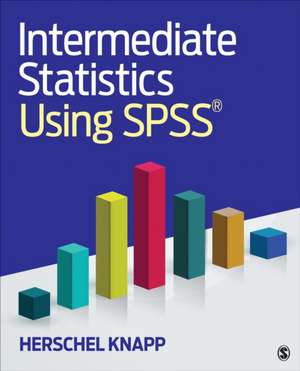Intermediate Statistics Using SPSS
Autor Herschel Knappen Limba Engleză Paperback – 17 dec 2017
Herschel Knapp's friendly and approachable guide to real-world statistics answers these questions. Intermediate Statistics Using SPSS is not about abstract statistical theory or the derivation or memorization of statistical formulas–it is about applied statistics. With jargon-free language and clear processing instructions, this text covers the most common statistical functions–from basic to more advanced. Practical exercises at the conclusion of each chapter offer students an opportunity to process viable data sets, write cohesive abstracts in APA style, and build a thorough comprehension of the statistical process. Students will learn by doing with this truly practical approach to statistics.
Ancillaries
Free downloadable tutorial videos provide an overview of each statistical method!
Preț: 469.46 lei
Preț vechi: 941.92 lei
-50% Nou
89.84€ • 93.91$ • 75.92£
Carte indisponibilă temporar
Specificații
ISBN-10: 1506377432
Pagini: 480
Dimensiuni: 187 x 232 x 23 mm
Greutate: 0.8 kg
Ediția:1
Editura: SAGE Publications
Colecția Sage Publications, Inc
Locul publicării:Thousand Oaks, United States
Recenzii
“Knapp's text is a wonderful resource to keep students afloat while navigating the turbulent statistical waves of indecision and bewilderment.”
“This is a fantastic resource for figuring out when to use which statistical procedure and provides step-by-step instructions for running the procedure within SPSS®.”
“Intermediate Statistics using SPSS provides readers with both a gentle introduction to statistical application using the IBM SPSS software package and a down-to-earth illustration of relevant concepts.”
“This book builds on the style used by Andy Field and is written in a manner that is accessible and enjoyable to today's student. I expect that the text will be adopted across the social and behavioral sciences for use in introduction to statistics courses at the doctoral level.”
Cuprins
Acknowledgments
About the Author
PART I: STATISTICAL FUNDAMENTALS
1. Research Principles
Learning Objectives
Overview—Research Principles
Rationale for Statistics
Research Questions
Treatment and Control Groups
Rationale for Random Assignment
Hypothesis Formulation
Reading Statistical Outcomes
Accept/Reject Hypotheses
Variable Types/Levels of Measure
Good Common Sense
Key Concepts
Practice Exercises
2. Working in SPSS
Learning Objectives
Video
Overview—SPSS
Two Views: Variable View and Data View
Saving Data Files
Good Common Sense
Key Concepts
Practice Exercises
PART II: SUMMARIZING VARIABLES
3. Descriptive Statistics
Learning Objectives
When to Use This Statistic
Videos
Overview—Descriptive Statistics
Descriptive Statistics
SPSS—Loading an SPSS Data File
Data Set
Test Run
SPSS—Descriptive Statistics: Continuous Variables (Age)
SPSS—Descriptive Statistics: Categorical Variables (Gender)
SPSS—Descriptive Statistics: Continuous Variables (Age) Select by Categorical Variable (Gender)—Females Only
SPSS—(Re)Selecting All Variables
Good Common Sense
Key Concepts
Practice Exercises
PART III: MEASURING DIFFERENCES BETWEEN GROUPS
4. t Test and Mann-Whitney U Test
Learning Objectives
When to Use This Statistic
Videos
Overview—t Test
Overview—Mann-Whitney U Test
Good Common Sense
Key Concepts
Practice Exercises
5. ANOVA and Kruskal-Wallis Test
Learning Objectives
When to Use this Statistic
Videos
Layered Learning
Overview—ANOVA
Overview—Kruskal-Wallis Test
Good Common Sense
Key Concepts
Practice Exercises
6. ANCOVA
Learning Objectives
When to Use This Statistic
Video
Layered Learning
Overview—ANCOVA
Groups
Procedure
Hypotheses
Data Set
Pretest Checklist
Test Run
Results
Hypothesis Resolution
Abstract
Good Common Sense
Key Concepts
Practice Exercises
7. MANOVA
Learning Objectives
When to Use This Statistic
Video
Layered Learning
Overview—MANOVA
Groups
Procedure
Hypotheses
Data Set
Pretest Checklist
Test Run
Results
Hypothesis Resolution
Abstract
Good Common Sense
Key Concepts
Practice Exercises
PART IV: MEASURING DIFFERENCES OVER TIME
8. Paired t Test and Wilcoxon Test
Learning Objectives
When to Use This Statistic
Videos
Overview—Paired t Test
Overview—Wilcoxon Test
Good Common Sense
Key Concepts
Practice Exercises
9. ANOVA Repeated Measures
Learning Objectives
When to Use This Statistic
Video
Layered Learning
Overview—ANOVA Repeated Measures
Variations on Longitudinal Design
Good Common Sense
Key Concepts
Practice Exercises
PART V: MEASURING RELATIONSHIP BETWEEN VARIABLES
10. Chi-Square
Learning Objectives
When to Use This Statistic
Video
Overview—Chi-Square
Good Common Sense
Key Concepts
Practice Exercises
11. Correlation and Regression: Pearson and Spearman
Learning Objectives
When to Use this Statistic
Tutorial Videos
Overview—Pearson Correlation
Groups
Overview—Spearman Correlation
Alternate Use for Spearman Correlation
Good Common Sense
Key Concepts
Practice Exercises
12. Multiple Regression
Learning Objectives
When to Use This Statistic
Video
Overview—Multiple Regression
Supplemental Processing Methods
Good Common Sense
Key Concepts
Practice Exercises
13. Logistic Regression
Learning Objectives
When to Use This Statistic
Video
Overview—Logistic Regression
Good Common Sense
Key Concepts
Practice Exercises
PART VI: DATA HANDLING
14. Supplemental SPSS Operations
Learning Objectives
Overview—Supplemental SPSS Operations
Creating Dummy Variables Using Syntax
Data Sets
Good Common Sense
Key Concepts
Practice Exercises
Glossary
Index
Notă biografică
Herschel Knapp, PhD, MSSW, has more than 25 years of experience as a health care professional in a variety of domains. In addition to his clinical work as a psychotherapist, primarily in hospital settings, he has provided project management for innovative implementations designed to improve the quality of patient care via multisite, health science implementations. He teaches master¿s-level courses at the University of Southern California; he has also taught at the University of California, Los Angeles and California State University, Los Angeles. Dr. Knapp has served as the lead statistician on a longitudinal cancer research project and managed the program evaluation metrics for a multisite, nonprofit children¿s center. His clinical work includes emergency/trauma therapy in hospital settings. Dr. Knapp has developed and implemented innovative telehealth systems, utilizing videoconferencing technology to facilitate optimal health care service delivery to remote patients and to coordinate specialty consultations among health care providers, including interventions to diagnose and treat people with HIV and hepatitis, with special outreach to the homeless. He is currently leading a nurse research mentorship program and providing research and analytic services to promote excellence within a health care system. The author of numerous articles in peer-reviewed health science journals, he is also the author of other textbooks, including Introductory Statistics Using SPSS (2nd ed., 2017), Practical Statistics for Nursing Using SPSS (2017), Therapeutic Communication: Developing Professional Skills (2nd ed., 2014), and Introduction to Social Work Practice: A Practical Workbook (2010).
